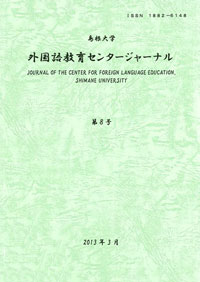島根大学外国語教育センター
ISSN:1882-6148

ダウンロード数 : ? 件
この文献の参照には次のURLをご利用ください : https://ir.lib.shimane-u.ac.jp/28618
島根大学外国語教育センタージャーナル 7
2012-03 発行
Informal English learning via mobile phones
ファイル
内容記述(抄録等)
This is an improved version of the refereed paper presented at the International Conference on Mobile Phone Learning, Spain, March 2011. The paper reports a three year ubiquitous informal English learning project mainly designed for Japanese first year university students.The purpose of the project is to help students develop English reading, vocabulary and grammar ability through reading essays and doing grammar, vocabulary quizzes on their mobile phones. Various types of English learning materials are regularly sent to students' mobile phones. Learning activities are not merely intended to be performed one-way on the students' side, but with different forms of interactions such as commenting, ranking and quizzing. A quick online survey to investigate the efficacy of the project was conducted in 2011 and the result shows the project was well-received by the participants. This project indicates mobile phones are not only a suitable tool for vocabulary study but also an ideal tool for developing reading and grammar ability. From the same project, other findings demonstrated that students are more motivated in reading, than in taking language quizzes in spite of the fact that quizzes have interactive features; that students read most of the emails sent to their mobile phones but are very cautious about accessing web links embedded in the email despite being told beforehand that such web links would be safe; that students basically do not mind when the learning materials are sent to them but that evenings are considered to be more convenient for them to conduct mobile learning.
About This Article
Other Article
